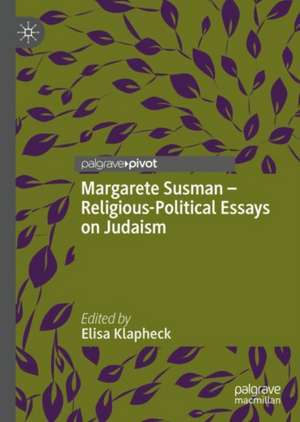Margarete Susman - Religious-Political Essays on Judaism: Jewish Thought and Philosophy
Editat de Elisa Klapheck Traducere de Laura Radoshen Limba Engleză Hardback – 4 ian 2022
Preț: 778.01 lei
Preț vechi: 948.79 lei
-18% Nou
Puncte Express: 1167
Preț estimativ în valută:
148.89€ • 154.87$ • 122.92£
148.89€ • 154.87$ • 122.92£
Carte tipărită la comandă
Livrare economică 12-26 aprilie
Preluare comenzi: 021 569.72.76
Specificații
ISBN-13: 9783030894733
ISBN-10: 3030894738
Pagini: 127
Ilustrații: IX, 132 p.
Dimensiuni: 148 x 210 mm
Greutate: 0.33 kg
Ediția:1st ed. 2021
Editura: Springer International Publishing
Colecția Palgrave Macmillan
Seria Jewish Thought and Philosophy
Locul publicării:Cham, Switzerland
ISBN-10: 3030894738
Pagini: 127
Ilustrații: IX, 132 p.
Dimensiuni: 148 x 210 mm
Greutate: 0.33 kg
Ediția:1st ed. 2021
Editura: Springer International Publishing
Colecția Palgrave Macmillan
Seria Jewish Thought and Philosophy
Locul publicării:Cham, Switzerland
Cuprins
Chapter 1: Introduction.- Chapter 2: Three (or four) major essays of Margarete Susman.- Chapter 3: The Revolution and the Jews (1919).- Chapter 4: The Job Question in Franz Kafka (1929).- Chapter 5: Judaism—A World Religion (1932).- Chapter 6: The Problem of Emancipation (1934).- Chapter 7: Biographical chart of Susman’s life.
Notă biografică
Margarete Susman (1872-1966) was a German-Jewish writer, poet, and critic. In 1933 she fled to Switzerland, where she published Das Buch Hiob und das Schicksal des jüdischen Volkes (1946), the first comprehensive religious interpretation of the Shoah.
Elisa Klapheck (1962) is Professor of Jewish Studies at the University of Paderborn, Germany, and author of Fräulein Rabbiner Jonas. The Story of the First Woman Rabbi (2004). She serves as a rabbi for the Jewish Community of Frankfurt.
Elisa Klapheck (1962) is Professor of Jewish Studies at the University of Paderborn, Germany, and author of Fräulein Rabbiner Jonas. The Story of the First Woman Rabbi (2004). She serves as a rabbi for the Jewish Community of Frankfurt.
Textul de pe ultima copertă
Margarete Susman was among the great Jewish women philosophers of the twentieth century, and largely unknown to many today. This book presents, for the first time in English, six of her important essays along with an introduction about her life and work. Carefully selected and edited by Elisa Klapheck, these essays give the English-speaking reader a taste of Susman’s religious-political mode of thought, her originality, and her importance as Jewish thinker. Susman's writing on exile, return, and the revolutionary impact of Judaism on humanity, illuminate enhance our understanding of other Jewish philosophers of her time: Martin Buber, Franz Rosenzweig, and Ernst Bloch (all of them her friends). Her work is in particularly fitting company when read alongside Jewish religious-political and political thinkers such as Bertha Pappenheim, Hannah Arendt, Simone Weil, and Gertrud Stein. Initially a poet, Susman became a follower of the Jewish Renaissance movement, secular Messianism, and the German Revolution of 1918. This collection of essays shows how Susman's work speaks not only to her own time between the two World Wars but to the present day.
Margarete Susman (1872-1966) was a writer, poet, and critic, and the author of Das Buch Hiob und das Schicksal des jüdischen Volkes (1946)
Elisa Klapheck (1962) is Professor of Jewish Studies at the University of Paderborn, Germany, and author of Fräulein Rabbiner Jonas. The Story of the First Woman Rabbi (2004). She serves as a rabbi for the Jewish Community of Frankfurt.
Margarete Susman (1872-1966) was a writer, poet, and critic, and the author of Das Buch Hiob und das Schicksal des jüdischen Volkes (1946)
Elisa Klapheck (1962) is Professor of Jewish Studies at the University of Paderborn, Germany, and author of Fräulein Rabbiner Jonas. The Story of the First Woman Rabbi (2004). She serves as a rabbi for the Jewish Community of Frankfurt.
Caracteristici
These essays give the English-speaking reader a taste of Susman’s religious-political mode of thought Revolutionary impact on humanity, exile, and return illuminate and enhance those of other Jewish philosophers Susman's work speaks not only to her own time between the two World Wars but to the present day.




